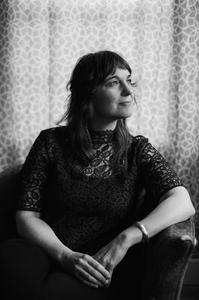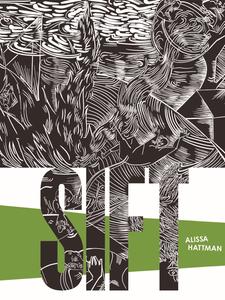
|
|
| photo: Jason Quigley | |
Alissa Hattman's writing has appeared in Carve, the Rumpus, the Gravity of the Thing, Propeller, surely, and elsewhere. Hattman has taught writing classes and workshops for more than 15 years and has worked as a fiction editor, book reviewer, zine librarian, writing group facilitator, and artist-in-residence at several arts centers, most recently at Gullkistan, Center for Creativity in Iceland. Originally from North Dakota, she now lives and teaches in the Pacific Northwest. Hattman is the author of the novella Sift (The 3rd Thing, September 5, 2023), which was shortlisted for the 2024 Ursula K. Le Guin Prize for Fiction.
Handsell readers your book in 25 words or less:
Sift is a speculative novella that follows two women as they journey through the heart of a mountain.
On your nightstand now:
I tend to read short essays, interviews, or writer correspondence before bed. Right now, it's Between Friends: The Correspondence of Hannah Arendt and Mary McCarthy, edited by Carol Brightman; Braiding Sweetgrass by Robin Wall Kimmerer; The Book of (More) Delights by Ross Gay; and the current issue of the Paris Review. During hard times, I'll read a passage from When Things Fall Apart by Pema Chödrön.
Favorite book when you were a child:
If I had to choose just one, it would be Charlotte's Web. I read all of E.B. White's children's books when I was a kid. His language is so precise and tender. I appreciated the honest depiction of mortality in the book. I had a lot of complicated feelings about death when I was a child and reading Charlotte's Web validated those feelings. It's a book as much about death as it is about the life-affirming act of writing. I know it inspired me to write. It was probably also the reason I became a vegetarian.
Your top five authors:
Clarice Lispector for her urgency and mystery and strange sentences; Robin Wall Kimmerer for her keen insight and expansive ecological consciousness; Toni Morrison for her radical imagination; Herman Melville for his complex depictions of desire and conflict; and Ursula K. Le Guin for undoing my notions of narrative and helping me see new worlds.
Book you've faked reading:
I've never read any of the Harry Potter books and I've never watched any of the movies, but I worked in book sales during the Potter craze and basically had to fake it, which wasn't hard.
 Book you're an evangelist for:
Book you're an evangelist for:
This changes every year, but this year I've enjoyed talking with people about Christine Lai's Landscapes, which I loved. It's a book that takes risks by inviting intersections of art, feminism, and environmentalism, making leaps in time, and inhabiting precarious states of grief, trauma, and survival in an uncertain world. There's this wonderful sense of resiliency in the story, a making do with what remains.
Book you've bought for the cover:
I bought Claudia Piñeiro's Elena Knows because of the gorgeous cover design. Charco Press's overall curation and aesthetic is marvelous.
Book you hid from your parents:
I can't remember hiding any books from my parents other than my journal. I have a memory of reading my mom's copy of Clarissa Pinkola Estés's Women Who Run with the Wolves when I was 13 and not telling her that I read it. I remember, reading the book, feeling this awkward, itchy sense of empowerment; as a teenager, I wasn't sure what to do with that feeling and I suppose it wasn't something I was ready to talk about with her. We did eventually end up having a great discussion about the book later when I was in college.
Book that changed your life:
The Bluest Eye by Toni Morrison was the first time I experienced a book teaching me how to read it. I first read it in middle school, and I struggled to understand what was going on for most of the book, but still I found the writing absolutely gripping and couldn't stop. Slowly, I was able to figure out what was happening in the story. I had to read the whole book again, but it really changed the way I engaged with the world. I could provide a million examples, but the first that comes to mind is that I can't look at marigolds without thinking of Pecola's story. The Bluest Eye taught me the type of patience and participation that good literature requires, and it was thrilling.
Favorite line from a book:
I can't choose a favorite, but this is one that I love:
"My most primary struggle for the most primary life would open with the calm, devouring ferocity of desert animals." --Clarice Lispector, The Passion According to G.H.
Five books you'll never part with:
Cane: A New Critical Edition by Jean Toomer
Stranged Writing: A Literary Taxonomy, an anthology published by The Gravity of the Thing
Float by Anne Carson
Teaching to Transgress by bell hooks
The Books of Earthsea: The Complete Illustrated Edition by Ursula K. Le Guin, illustrated by Charles Vess
Book you most want to read again for the first time:
Earthlings by Sayaka Murata. This is such a wonderfully strange, utterly surprising, intense book. I loved it. My first reading was informed by a manufacturer glue error with the binding, and pages from the book kept falling out as I read. The story was so strange that for a minute I was convinced that this was happening on purpose! I returned the book, and look forward to re-reading, but the weirdness probably won't ever match that first time.
Five books from small presses that you love:
Arctic Play by Mita Mahato (The 3rd Thing)
#TravelingWhileTrans by Jessica Wadleigh (zines + things)
Loaners by Ben Hodgson and Laura Moulton (Perfect Day Publishing)
Sister Golden Calf by Colleen Burner (Split/Lip Press)
Wild Milk by Sabrina Orah Mark (Dorothy, a publishing project)

